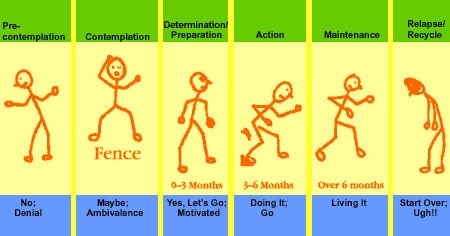“Bad habits are like a comfortable bed, easy to get into, but hard to get out of.”
Anon.
Changing habits is not is not easy, it takes time, commitment and patience. The American Council on Exercise (ACE) suggests that understanding where you are at in Prochaska & Di Clemente’s Stages-of-Change Model – originally devised around the field of smoking cessation and subsequently applied to other areas of behavioural change, including exercise – is a very useful tool.
“We all go through noticeable, obvious phases when making decisions to change habits, said Dr. Cedric Bryant, the ACE chief science officer. “By taking the time to evaluate if you are ready to start exercising, you’ve thoughtfully planted yourself on the path to better health and fitness.”
Pre-contemplation – Ignorance is Bliss
You are in denial. You are not intending to change anytime soon (that is, within six months). You are unaware of and/or denying the need for lifestyle change. You’re pessimistic, especially about your ability to change or the real benefits of becoming more active and modifying your diet.
Contemplation – Sitting on the Fence
You’re considering it. Weighing the costs, effort and time commitment, you mull over joining a fitness or weight-loss programme in the near future. This stage is often characterised by ambivalence. You may remain in this stage for months or even years.
Preparation – Testing the Water
You’ve made the first move. You’ve started to limit your consumption of junk food and/or you have joined a gym and are exercising periodically.
Action – Changing your Behaviour
You’re working out, going to your yoga class, walking regularly, planning meals and/or keeping a diet record. Unfortunately, during the action stage, you are at greatest risk for relapse.
Maintenance – You’ve done it
You have successfully sustained lifestyle modification. You continue to actively utilise methods to monitor and control your behaviour. You may even be avoiding situations that would increase the probability of slips and relapse.
Relapse – Fall from Grace
Happens to us all now and then. You need to evaluate the trigger for relapse, reassess your motivation and the barriers to exercise and plan stronger coping strategies.
Source: www.ace.org




